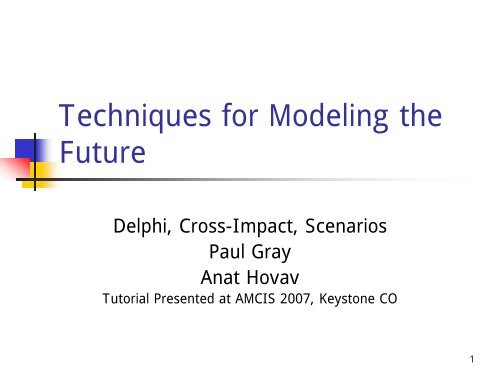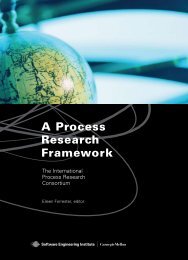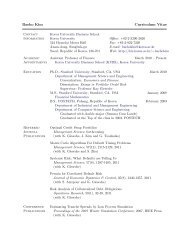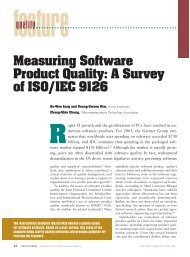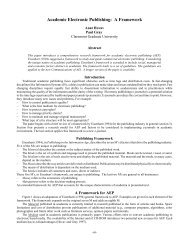From Hindsight to Foresight: Applying Delphi, Cross-Impact Analysis ...
From Hindsight to Foresight: Applying Delphi, Cross-Impact Analysis ...
From Hindsight to Foresight: Applying Delphi, Cross-Impact Analysis ...
You also want an ePaper? Increase the reach of your titles
YUMPU automatically turns print PDFs into web optimized ePapers that Google loves.
Techniques for Modeling the<br />
Future<br />
<strong>Delphi</strong>, <strong>Cross</strong>-<strong>Impact</strong>, Scenarios<br />
Paul Gray<br />
Anat Hovav<br />
Tu<strong>to</strong>rial Presented at AMCIS 2007, Keys<strong>to</strong>ne CO<br />
1
Outline<br />
• ABOUT STUDYING THE FUTURE<br />
• Assumptions<br />
• Dealing with Uncertainty<br />
• Using Experts<br />
• <strong>Delphi</strong><br />
• <strong>Cross</strong>-<strong>Impact</strong><br />
• Scenarios<br />
• Discussion<br />
A handout shows a typical scenario<br />
2
Futures Research Assumptions<br />
• The future is not prewritten nor wholly determined<br />
by what we know now<br />
• Present conditions and trends will be evolutionary<br />
unless natural limits or external changes occur<br />
• External changes are inherently uncertain<br />
• Some depend on human choice (policy)<br />
• Future conditions can be altered by social<br />
resources<br />
3
Dealing with Uncertainty<br />
• By fiat (I say, you do)<br />
• Extrapolate his<strong>to</strong>rical data. Implies<br />
assuming all developments are<br />
foreseeable<br />
• Elicit and evaluate judgments about the<br />
future from groups of experts (wisdom<br />
of crowds)<br />
• Synthesis of methods 2 and 3<br />
4
Who Are Experts? When<br />
Should You Use Them?<br />
• Defn: People qualified <strong>to</strong> explore answers<br />
from a relevant disciplinary perspective.<br />
Includes practitioners and users<br />
• Use when: little or no source of facts<br />
• A basis for opinion exists<br />
• Info. is likely <strong>to</strong> affect decision<br />
• Expert opinion is an acceptable source<br />
5
Types of Issues for Experts<br />
• Tech forecasts<br />
• Social forecasts<br />
• Resolving uncertainty<br />
• Determining consumer needs<br />
• Desirability of change<br />
• Lack of documentation of current state<br />
• Interpreting his<strong>to</strong>ry<br />
6
Role of Experts<br />
• Offer critique of ideas<br />
• Interpret unintended consequences<br />
• Evaluate quality of new concepts<br />
• Imagine what can be done<br />
• Estimate how well (poorly) idea will work<br />
• Invent new ideas beyond those of the<br />
group<br />
7
Outline<br />
• About Studying the Future<br />
• DELPHI<br />
• Procedures<br />
• Events and Trends<br />
• Research Results<br />
• <strong>Cross</strong>-<strong>Impact</strong><br />
• Scenarios<br />
• Discussion<br />
A handout shows a typical scenario<br />
8
<strong>Delphi</strong><br />
• Provides estimates of p (events) and<br />
evolution of trends over time<br />
• Use when there is little factual data and<br />
a basis for opinion exists, and decisions<br />
and policies are required<br />
• His<strong>to</strong>ry of <strong>Delphi</strong>. Inven<strong>to</strong>rs<br />
9
<strong>Delphi</strong> Procedure<br />
• Multistage (= Rounds)<br />
• Present his<strong>to</strong>ry and ask questions <strong>to</strong> expert<br />
panel<br />
• Provide anonymity <strong>to</strong> respondents<br />
• Panelists make estimates, give reasons<br />
• Analyze data from a round. Feed it back <strong>to</strong><br />
the panel, including rationale for extreme<br />
values<br />
• Repeat rounds with re-estimates until<br />
consensus or dissensus is reached.<br />
10
Candidate Events and Trends<br />
• Event: when will a virus be created that<br />
cannot be contained or countered?<br />
(E,ML,L)<br />
• Trend: $ loss from phishing<br />
• Social acceptance: Fingerprint ID of PC<br />
users; cell phone loca<strong>to</strong>rs<br />
REMINDER: Creating any questionnaire<br />
(including <strong>Delphi</strong>) requires care and pretesting<br />
11
Sample Answers <strong>to</strong><br />
Questionnaire<br />
Question 2008 2012 2016 2020 Never<br />
LINUX market<br />
share >Microsoft<br />
An unfixable virus<br />
is created<br />
Annual $ loss<br />
from phishing<br />
0.02 0.05 0.10 0.20<br />
E M L<br />
50000 30000 20000 50000 --<br />
Loss from Phishing ($M)<br />
40000<br />
30000<br />
20000<br />
10000<br />
0<br />
1 2 3 4 5 6<br />
Years<br />
12
Research Results on <strong>Delphi</strong><br />
• Average error declines with size of group<br />
• Accuracy of group better on 2 nd but not later<br />
iteration<br />
• Smaller dispersion more accurate result<br />
• Higher self-confidence greater accuracy<br />
13
<strong>Delphi</strong> Advantages<br />
• Provides a framework in which <strong>to</strong> work<br />
• Anonymity minimizes follow the leader,<br />
specious persuasion, other psych barriers<br />
• Allows everyone <strong>to</strong> be heard w/o labels<br />
• Provides precise documented records<br />
14
<strong>Delphi</strong> Disadvantages<br />
• Participants lose stimulation of face-<strong>to</strong>-face<br />
contact<br />
• Panelists can (and do) drop out between<br />
rounds even in computer-based <strong>Delphi</strong><br />
15
Conclusions on <strong>Delphi</strong><br />
• Now well established<br />
• An input <strong>to</strong> cross-impact and scenarios<br />
• By using wisdom of crowds when the<br />
crowd knows something about subject<br />
commends its use where other<br />
approaches fail<br />
16
Outline<br />
• About Studying the Future<br />
• <strong>Delphi</strong><br />
• <strong>Cross</strong>-<strong>Impact</strong><br />
• Why cross impact<br />
• <strong>Cross</strong>-impact table<br />
• Mechanics<br />
• Outcomes<br />
• Scenarios<br />
• Discussion<br />
A handout shows a typical scenario<br />
17
<strong>Cross</strong> <strong>Impact</strong><br />
• <strong>Delphi</strong> gives individual, independent forecasts<br />
• Assumes “all other things being equal”, which<br />
they are not.<br />
• The order in which things happen can change<br />
and affect outcomes.<br />
• Example from security: advanced preventives,<br />
secure operating system, uncontainable virus<br />
• Role of cross-impact is <strong>to</strong> model these effects<br />
• His<strong>to</strong>ry of cross-impact<br />
18
<strong>Cross</strong>-<strong>Impact</strong> Table<br />
If event:<br />
A<br />
B<br />
C<br />
XI on A XI on B XI on C XI on<br />
trend<br />
1 2 3 1.05<br />
0.5 1 1 1.2<br />
1 0.25 1 0.9<br />
19
Mechanics of <strong>Cross</strong> <strong>Impact</strong><br />
• Define time interval and scene length<br />
2008 2012 2016 2020 2024<br />
• Inputs: probability, event x-impact, trends,<br />
trend x-impact<br />
• Run multi-period simulation. Outputs of one<br />
scene are inputs <strong>to</strong> the next<br />
20
Mechanics of <strong>Cross</strong>-<strong>Impact</strong><br />
• In a scene, decide which event occurs<br />
• Update values in next scene depending<br />
on whether event occurred or not<br />
• Include both recurring and nonrecurring<br />
events and all trends<br />
• Repeat until you reach end of last scene<br />
• RESULT: A Scenario<br />
21
Expected Outcomes<br />
• Create a large number of scenarios<br />
• Determine the mean and variance and<br />
time distribution of the outcomes<br />
• Use extreme scenarios <strong>to</strong> help<br />
understand the range of outcomes that<br />
can be encountered<br />
• Use result <strong>to</strong> help set policies for<br />
expected outcomes and contingencies.<br />
22
Conclusions on <strong>Cross</strong>-<strong>Impact</strong><br />
• <strong>Cross</strong>-impacts exist . They allow modeling<br />
disruptive changes and interdependencies<br />
• No methodology is standard; Deals with<br />
second order effects but not third order<br />
order effects<br />
• Although out of fashion, cross impact is a<br />
useful analytic <strong>to</strong>ol that merits further<br />
development<br />
23
OUTLINE<br />
• About Studying the Future<br />
• <strong>Delphi</strong><br />
• <strong>Cross</strong>-<strong>Impact</strong><br />
• SCENARIOS<br />
• What are scenarios<br />
• Assumptions about scenarios<br />
• Development principles<br />
• Characteristics<br />
• Scenario space and developing scenarios<br />
• Pitfalls <strong>to</strong> avoid<br />
• Conclusions<br />
• Discussion<br />
A handout shows a typical scenario<br />
24
Scenarios<br />
• S<strong>to</strong>ries about alternative futures<br />
• A way of communicating with managers<br />
and non-experts<br />
• Describe some future or plausible state<br />
of the firm at a specific time<br />
• Used <strong>to</strong> stimulate future plans,<br />
strategies and business choices<br />
25
Assumptions about Scenarios<br />
• To avoid information overload, a set of<br />
assumptions and constraints need <strong>to</strong> be<br />
established:<br />
• Purpose<br />
• Domain<br />
• Geopolitics and economics<br />
• Time frame<br />
• Unit of <strong>Analysis</strong><br />
26
Scenario Development<br />
Principles<br />
• Identify the critical (or possible) choices<br />
that the subject is likely <strong>to</strong> face<br />
• Identify the key drivers<br />
• Model the scenario space<br />
• Use the scenarios <strong>to</strong> determine strength<br />
and weaknesses of the organization and<br />
<strong>to</strong> create alternative contingency<br />
policies<br />
27
Characteristics of Scenarios<br />
• Possible<br />
• Technically and/or socially feasible<br />
• Plausible<br />
• The reader of the scenario would believe<br />
that the events could occur<br />
• Internally consistent<br />
• All parts of the scenario are consistent with<br />
one another<br />
28
Scenario Space (example)<br />
High technical<br />
security level<br />
A highly trusted<br />
environment<br />
A “Big Brother”<br />
environment *<br />
Low technical<br />
security level<br />
Status-quo<br />
Chaos<br />
Low identity theft<br />
level<br />
High identity theft<br />
level<br />
* See handout for a sample scenario based on the H-H dimensions<br />
29
Developing scenarios<br />
• Select system variables of interest<br />
• Forecast system parameters<br />
• Select scenario space<br />
• Perform a consistency check<br />
• Develop measurements<br />
• Write the scenarios<br />
• <strong>Analysis</strong> and policy development<br />
30
Pitfalls <strong>to</strong> Avoid<br />
• Scenarios are not the outcome<br />
• They do not define the future, only describe<br />
possible futures<br />
• Scenarios are not a forecast<br />
• Users should not assume that any one of the<br />
scenarios describes the future<br />
• Scenarios are not static<br />
• Assumptions change rapidly<br />
• Scenarios must be re-evaluated periodically<br />
31
Conclusions about Scenarios<br />
• Scenario building is both an art and a<br />
science<br />
• The process has <strong>to</strong> be replicable<br />
• The requirements for internal<br />
consistency lead <strong>to</strong> the creation of pure<br />
scenarios<br />
• There are no guidelines for building<br />
mixed scenarios<br />
32
Conclusions about Scenarios<br />
• Scenarios are most valuable when<br />
• The external environment is highly<br />
uncertain<br />
• The environment might take plausible<br />
alternative trajec<strong>to</strong>ries<br />
• A specific set of indica<strong>to</strong>rs can be<br />
developed <strong>to</strong> measure the driving forces<br />
and their likely impacts if they were <strong>to</strong><br />
occur<br />
33
Outline<br />
• About Studying the Future<br />
• <strong>Delphi</strong><br />
• <strong>Cross</strong>-<strong>Impact</strong><br />
• Scenarios<br />
• Discussion<br />
A handout shows a typical scenario<br />
34
Working Paper<br />
• A draft of the complete article is<br />
available at:<br />
http://biz.korea.ac.kr/~anat/Workinpro<br />
gress.htm<br />
35
Essential <strong>Delphi</strong> Features<br />
• Anonymity<br />
• Feedback between rounds<br />
• Re-estimate based on feedback<br />
• Use a facilita<strong>to</strong>r<br />
• Input on his<strong>to</strong>ry of events, trends<br />
36
Updating Probabilities<br />
• Probability of A in Scene i+1 is affected by occurrence or<br />
non-occurrence of B in scene i<br />
• Done in terms of odds.<br />
• Odds=p/(1-p); e.g., p=.6, odds =.6/.4=1.5<br />
• Find new odds by multiplying by x-impact<br />
• E.g., if XI=2, p=.6, odds= 1.5 New odds =2*1.5= 3, New<br />
p = .75<br />
• More complex <strong>to</strong> get new p if non-occurrence. In this case,<br />
if P(B) = 0.3, new P = .536<br />
37


